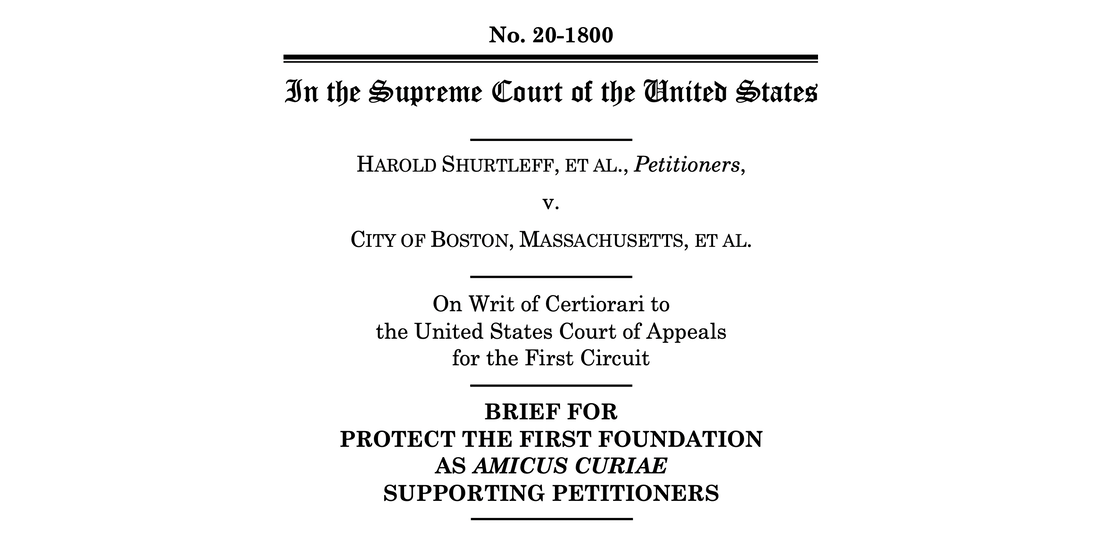Update: Shurtleff v. Boston: DOJ Cites “Viewpoint Discrimination” in Religious Liberty Case11/29/2021
Protect the First Foundation filed an amicus brief in Shurtleff v. Boston on Nov. 22nd in support of petitioners Harold Shurtleff and Camp Constitution. On the same day, the U.S. Department of Justice filed a brief of its own in support of the petitioners.
In this case, the city government of Boston allowed groups that host events on a city plaza to hoist their flags on a city-owned flagpole. Boston’s website states that the flag-raising program commemorates “flags from many countries and communities” with a goal to “foster diversity and build and strengthen connections among Boston’s many communities.” But when Camp Constitution — a group dedicated to celebrating the nation’s Judeo-Christian heritage and the Constitution — sought to fly its flag, the city denied it permission. The U.S. Court of Appeals for the First Circuit ruled that Boston was permitted to deny the flying of Camp Constitution’s flag (which includes a crimson cross against a blue background). The 1st Circuit reasoned that the decision was permissible because the flag would have been a “powerful governmental symbol” in favor of a religion. (Many have noted the irony of Boston taking this position. Its city flag proclaims in Latin, “God be with us as he was with our fathers.”) Now the Biden Administration’s DOJ is lining up behind arguments made by Protect the First Foundation and 15 other groups that have filed amicus briefs, including the Becket Fund and the American Civil Liberties Union. The DOJ wrote that the city’s flag-flying program “is not government speech” at all. The DOJ brief noted that the Supreme Court has “emphasized that the government cannot transform private speech into government speech merely by approving private messages expressed in a forum for private speakers.” Most importantly for free speech and religious liberty, the DOJ brief argues that while some reasonable content- and speaker-based restrictions are allowed in some of these forums, viewpoint discrimination is prohibited. DOJ asserted: The Court has long held that denying access to an otherwise-available forum simply because of the religious nature of the speech is viewpoint discrimination. DOJ’s position is rooted in a Supreme Court ruling in Lamb’s Chapel v. Center Moiriches Union Free School District, 508 U.S. 384 (1993) and Rosenberger v. Rector & Visitors of University of Virginia, 515 U.S. 819 (1995). In Lamb’s Chapel, the Court upheld the right of a Christian organization to conduct a series of films and discussions “from a Christian perspective” after hours at a public school otherwise open to many other civic and community organizations. And in Rosenberger, the Court held that the University of Virginia unconstitutionally discriminated based on viewpoint when it excluded religious activities from otherwise available funding. Bottom line: The Justices of the Supreme Court should reaffirm that when government treats religious speakers less favorably than nonreligious speakers, it is engaging in impermissible viewpoint discrimination. Comments are closed.
|
Archives
June 2024
Categories
All
|
ABOUT |
ISSUES |
TAKE ACTION |



 RSS Feed
RSS Feed